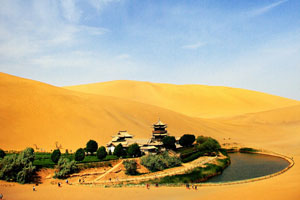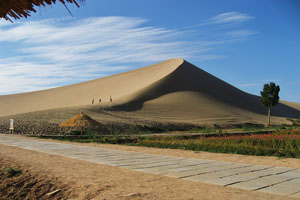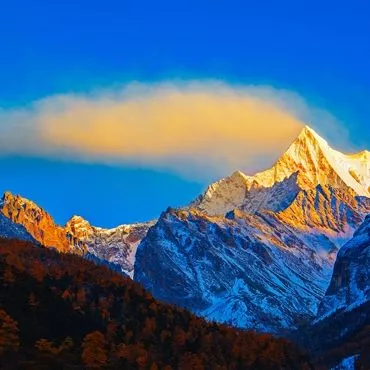Crescent Moon Spring and the Singing Sand Mountain
Crescent Moon Spring is 6km south of Dunhuang in the Singing Sands Mountains and is quite literally an oasis in the desert. The spring's name derives from the crescent moon shape the small pool of spring water has taken between two large sand dunes. Although the area is very dry, the pool doesn't dry up as one might expect.


Crescent Spring can be called a natural wonder in the Gobi Desert. Some people say it reminds them of the eye of a beautiful woman, lucid, beautiful and charming. Some say it looks like the mysterious, gentle and seductive lips of a pretty woman, or a slice of lush, sweet and crystal cantaloupe. Actually, it resembles a crescent fallen down into this desert. Having been lying among these sand dunes for thousands of years, although given many surprise attacks by sandstorms, Crescent Spring still gurgles clear, and still remains worthy as the first spring in the desert.
The Singing Sand Mountains are famous for the sounds the wind makes when blowing over the dunes. Also, the sand is said to be rather noisy when tread upon. The dunes are also famous for their size, some reaching 100m or more, relatively stable despite the fact that the dunes beyond the mountains shift frequently. Also, the sands are said to regain form overnight if tread upon the day before.
The climb to the top of the dunes is a sweaty work, but the dramatic view back across the rolling desert sands towards the oasis makes the effort worthwhile. To get to the top, visitors can ride bicycles or hire a taxi. Camel rides can also be arranged by local travel services. Descending the dunes is quite simple, slide down the dune to the sound of "rumbling sands" or the sound of thunder or a drum-roll as the wind sweeps across the sands. The thunder-like sound produced when sliding down along the sands is tremendous!
Legend has it that in ancient times a Chinese general had his army camped in the dunes beside the Crescent Lake. Noise from the encampment attracted the enemy, who attacked in the dead of night. The Han army beat their war drums to call the troops to arms. Suddenly, in the middle of the battle, a fierce wind blew up, filling the sky with sand and burying both armies. This is why, to this day, the wind blows across the sand's surface to the roll of war drums.













